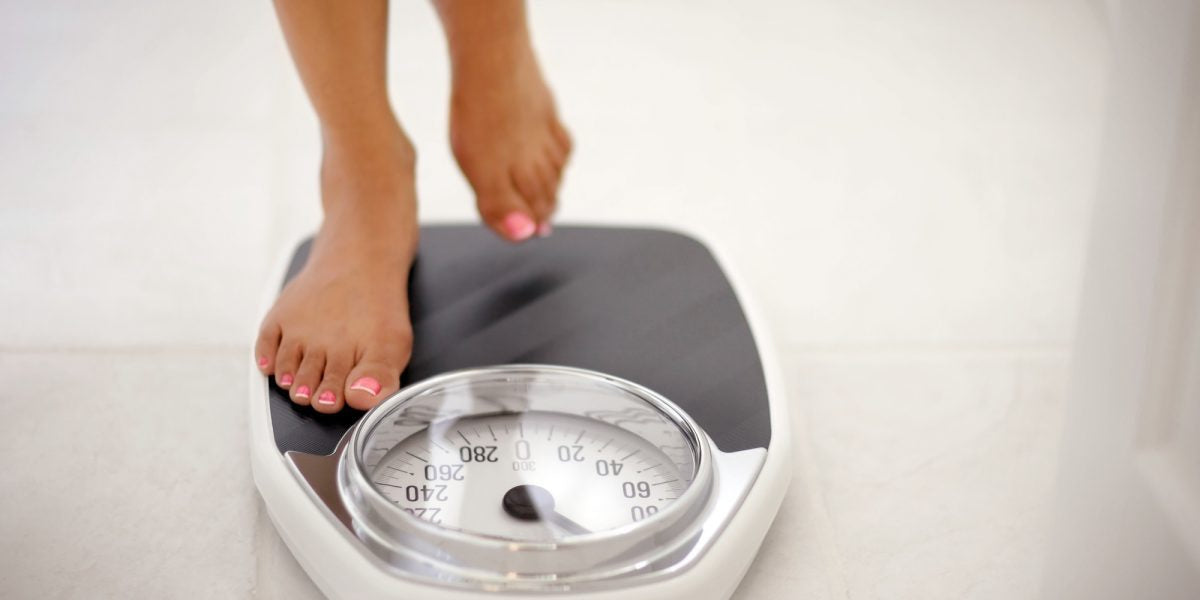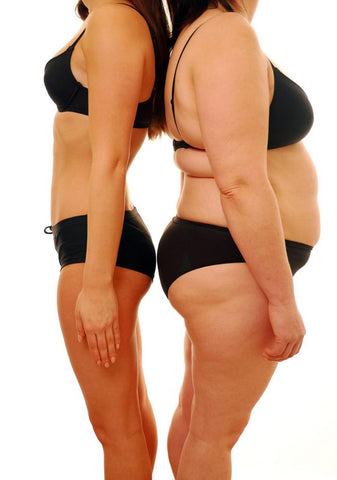Your Cart is Empty
7 Ways Probiotics Can Help With Healthy Weight Loss

Weight loss is a tricky business. There’s an endless array of weight loss pills, drinks and shakes that claim to help you shed pounds rapidly and look amazing in no time at all.
The sad truth is that many of these are just marketing hype (not all). Unless they can back it up with solid research, chances are they don’t work well.
In fact, scientists and doctors agree that losing weight fast is not healthy and can cause you to gain more weight than before. That’s why they recommend a steady rate of 2 pounds a week.
With that said, there are ways to help support healthy weight management. And if you want to lose weight in the long term, that’s where probiotics can help!
Although often available in a capsule form, probiotics are a dietary supplement and not a weight loss pill. Contained inside probiotics are live microorganisms that can provide numerous health benefits to the human body. Either when consumed in food or as a supplement.
Furthermore, substantial research shows that gut microbiota plays a major role in weight management. Keeping gut microbiota healthy and in balance is key to maintaining a healthy weight.
How Does Poor Gut Health Affect Weight Loss?
Gut microbes have an influence on whether certain people are predisposed to be obese or slim. It appears that the fewer species an individual has in their gut, the fatter they are likely to be.

Studies comparing lean people with obese people found significant difference in levels of gut bacteria.[1] Slim people were found to have vast numbers of different species of bacteria,
particularly the types that help to break down bulky plant fibers and complex starches.
These are foods that provide the body with an extra source of energy. Obese people, however, had fewer species of bacteria in their gut. This suggests that they feel less satisfied after eating, and also draw less energy from their food, which in turn causes them to eat more.
Another interesting finding is the effect that bacteria has on hormones. Certain types of bacteria modulate the levels of ‘hunger-stimulating’ hormones in the body (known as ghrelin). Eating a high-fat diet causes the bacteria in the gut to produce more acetate, which in turn increases the production of insulin.
Insulin promotes the storage of calories, as well as the production of ghrelin. Studies in rats have found that those with with higher levels of acetate tend to eat more and are at a higher risk of becoming obese.[2]
With this research in mind, let’s now take a look at how probiotics can play a key role in weight loss.
1. Probiotics Help You To Keep Excess Fat Off
There is good evidence to suggest that certain strains of probiotics can not only kick-start weight loss, but help you to keep it off.
In a study published in the British Journal of Nutrition[3], a team of researchers investigated the effects of probiotic supplementation on a group of 125 overweight men and women. Half of the subjects were given a daily probiotic supplement containing Lactobacillus rhamnosus, while the other half took a placebo. All of the subjects underwent a weight loss program for 12 weeks, followed by a 12-week maintenance program.
The results of the study were amazing – especially for women! The women taking the probiotic supplement showed an average weight loss of 4.4kg, while the women receiving the placebo lost only 2.6kg. The effects continued after the 12-week maintenance period, with the women in the probiotic group going on to lose more weight, while the women in the placebo group did not. By the end of the study, the women taking the probiotic supplement had lost an average of 5.2kg each.
That means that the women taking probiotics lost twice as much weight as the women taking the placebo.
Interestingly, there were no differences in weight loss among the male groups. The researchers concluded that this may have been because the study period wasn’t long enough to see meaningful results.
2. Probiotics Improve Gut Microbiota Needed For Weight Loss
Scientists have long known that gut microbiota and metabolism are intrinsically linked, especially when it comes to obesity. A number of studies have shown that the gut microbiota of obese people is vastly different from those who are a healthy weight. Imbalances in these intestinal bacteria – such as in the case of dysbiosis, are believed to be a major player in the risk factors for obesity.
It’s believed that this difference is in part due to diet. Regular consumption of foods that are high in fat and sugar – and low in fiber – are a major contributor to poor gut bacteria and dysbiosis. An interesting study on overweight adolescents showed that certain strains of probiotics and an associated IgA (white blood cell) response[4] contributed to weight loss.
This was particularly effective when additional lifestyle changes were made, such as healthy diet and exercise. Researchers suggested that healthy diet and consumption of probiotics had a positive effect on weight loss. And also improving immune system health.
3. Probiotics Can Change Your Metabolic Function
Adding probiotics to the daily diet has a variety of biochemical effects on the body, as well as in the gut.
In a Swiss study involving mice[5], scientists observed the effects of two different types of probiotic drink. The mice had been transplanted with human gut microbes. After comparing the levels of certain metabolites in the liver, blood and urine of the mice, it was found that those treated with probiotics showed marked differences in the way they metabolised bile acids.
Bile acids are made by the liver and work to break down fats in the upper gut. The study showed that probiotics may be able to influence the way in which these bile acids are metabolised, which spells possibilities for how humans can change their metabolic function and efficiency.
Interestingly, the metabolic effects differed significantly between the two probiotic strains, Lactobacillus paracasei and Lactobacillus rhamnosus. More research is pending.
4. Probiotics Can Reduce or Kill Candida
Candida albicans overgrowth – also known as Candidiasis – is a condition in which potentially harmful yeast cells proliferate in the gut, causing an imbalance of unhealthy bacteria. Although many species of the Candida yeast are harmless and live naturally within the gut, the overgrowth of the Candida albicans species disrupts a number of bodily functions.
This can lead to gut dysbiosis and a range of uncomfortable symptoms affecting digestion, immunity and hormones. Candida overgrowth is also a significant contributor to weight gain, as it can cause the liver to become overloaded with toxins. When this happens, the liver is less efficient at metabolising fats in the diet, which can lead to more fat being stored in the body.
Candida also disrupts hormone production, causing the thyroid to become sluggish and, in turn, slowing down the metabolism. Candida overgrowth is known to cause cravings for sugar and carbohydrates, as it is sugar that the yeast thrives on. This can make adhering to a healthy diet very difficult, which in turn further compromises weight loss.
Probiotics are one of the best ways to counter the imbalance of gut bacteria caused by Candida overgrowth. Research has shown that lactobacilli is particularly effective in suppressing Candidiasis and preventing the development of its biofilm in the gut.[6] This strain is also helpful in preventing Candidiasis from developing in the first place. Another probiotic strain known as Saccharomyces boulardii has also been found to inhibit the growth of Candida in the gut.
It does this by seeking out the binding sites on the intestinal wall lining used by Candida albicans, and then crowding it out. fact, S. boulardii is believed to be more effective at this mechanism than standard probiotics. Many natural health practitioners recommend treating Candidiasis by taking a probiotic supplement that contains a blend of Lactobacillus and S. boulardii species.
5. Probiotics Reduce Belly Fat
Abdominal adiposity – also known as belly fat – is a particularly difficult body fat to shift, and many adults struggle with it. However, probiotics may help to shed the belly fat layers,[7] with the probiotic strain Lactobacillus gasseri showing the most promising effects in aiding weight loss.
In a 2010 study, a group of obese adults drank 200g of a fermented milk product every day for 12 weeks. This milk product contained a strain of probiotic called Lactobacillus gasseri. By the end of the study, the subjects had lost an average of 4.6 percent of their abdominal visceral and subcutaneous body fat areas.
The researchers concluded that this particular strain of probiotic was able to reduce both belly fat and overall body weight, which could make it highly beneficial to those with metabolic disorders.
6. Probiotics Help To Manage Your Cravings
 As well as curbing the sugar cravings associated with Candida overgrowth, it appears that probiotics may have another mechanism for modulating appetite. In a ground-breaking new study, an American scientist claims to have created a type of bacteria that helps to promote feelings of satiety (fullness) and curb cravings for unhealthy food.[8]
As well as curbing the sugar cravings associated with Candida overgrowth, it appears that probiotics may have another mechanism for modulating appetite. In a ground-breaking new study, an American scientist claims to have created a type of bacteria that helps to promote feelings of satiety (fullness) and curb cravings for unhealthy food.[8]
This special bacteria lives in the intestines and releases a chemicals called N-acyl-phosphatidylethanolamines (NAPEs), which the body converts into lipids that suppress the appetite.
The bacteria have been tested in study involving obese mice, who were given the NAPE-secreting bacteria for six weeks. Throughout the study, the mice continued to be fed a high-fat diet. At the end of the study, the mice who received the bacteria had stopped gaining weight. The two control groups, however, continued to gain weight significantly. These included mice who received no bacteria and mice that received a non-NAPE bacteria.
It’s now hoped that the programmed bacteria could become a powerful weight loss strategy for those who may be genetically predisposed to obesity, or who simply struggle to shed pounds. It could also be useful for helping people to maintain a healthy weight after weight loss.
7. Probiotics Help Inhibit Absorption of Fat
With the evidence that Lactobacillus gasseri can help to reduce belly fat, further research into its weight loss mechanisms have been explored. A study involving rats showed that a diet containing Lactobacillus gasseri helped to lower the rats’ belly fat by preventing them from absorbing fat in the diet.[9]
More recently, a 2015 Japanese study investigated the effect of this particular probiotic strain on breaking down dietary fat in humans. The researchers gave the participants 100g of fermented milk to consume each day for seven days. Then they analyzed their feces. It was found that the strain of Lactobacillus gasseri increased the amount of fat excreted in their feces, indicating that the probiotics inhibited the amount of dietary fat absorbed the body.[10]
Effectively, the probiotic acted as a “fat blocker”, causing fat from food to be passed out of the body as waste and resulting in fewer calories being taken in. This could be a promising new weight loss mechanism, particularly for those consuming a Western diet.
Why Take Probiotics As Part of Your Weight Loss Plan?
With numerous studies supporting the weight loss benefits of probiotics, many health practitioners recommend including probiotic-rich foods and supplements in your daily diet. Probiotic supplements are available in capsules or powders in most health stores or online. Choose a product with multiple strains of bacteria, particularly those of the Lactobacillus species, as well as “guaranteed live bacteria”, as this will provide optimal efficacy.
You can also add probiotic foods to your diet, such as sauerkraut, kimchi, tempeh, miso and kefir. These foods not only contain the Lactobacillus species, but they’re low in sugar and an excellent source of live bacteria. Yogurt, kombucha and certain pickled products also contain probiotic benefits, but take care to note the amount of sugar they contain.
But the easiest (and most effective) way is to take the right probiotics formulated for weight loss.
Using tested weight loss probiotics from recent clinical studies, we at Better Body Co. have formulated a 3-strain probiotic supplement called Provitalize. Our users have reported to lose as much as 5 pounds within a week, even without any major change in their diet or lifestyle.
English
